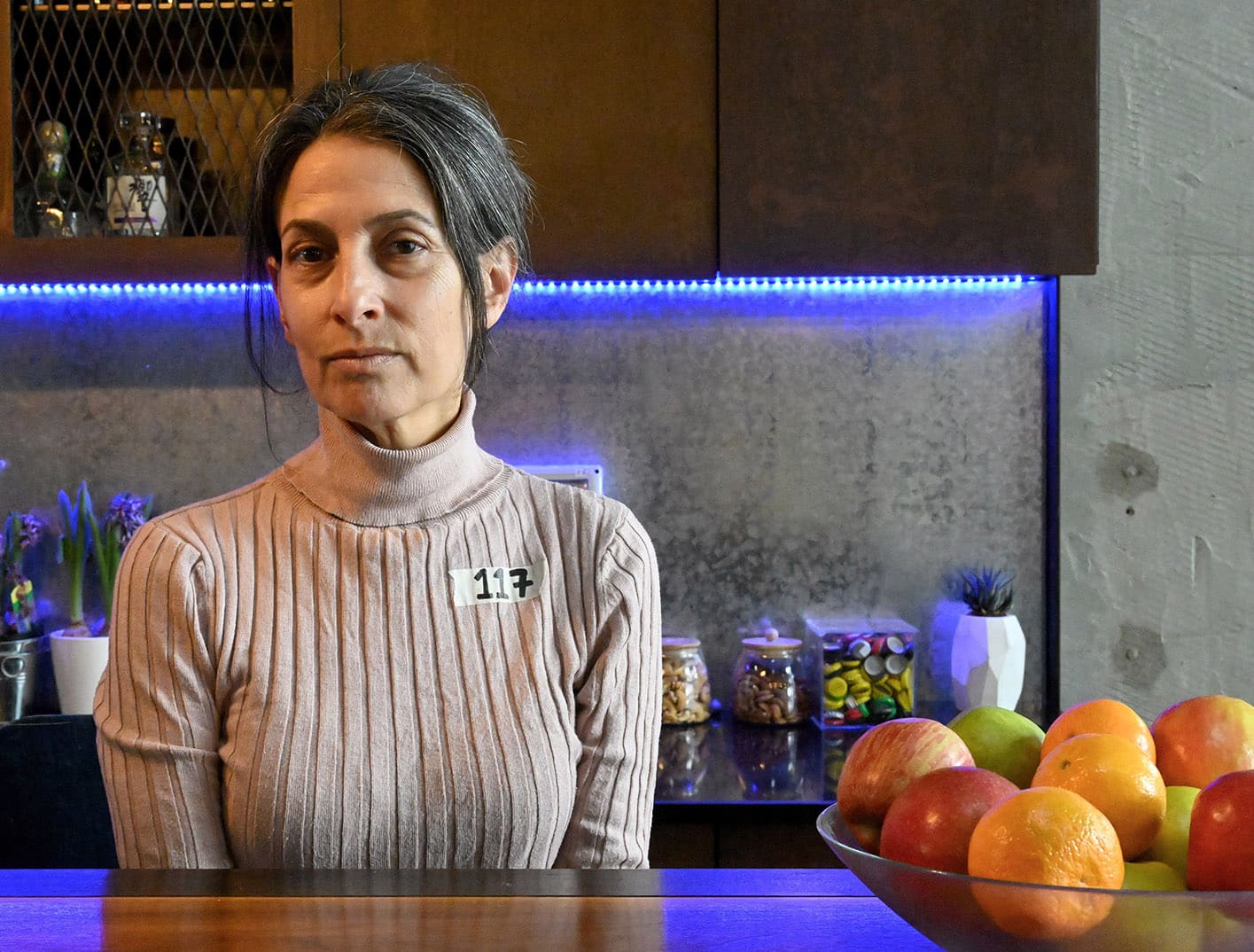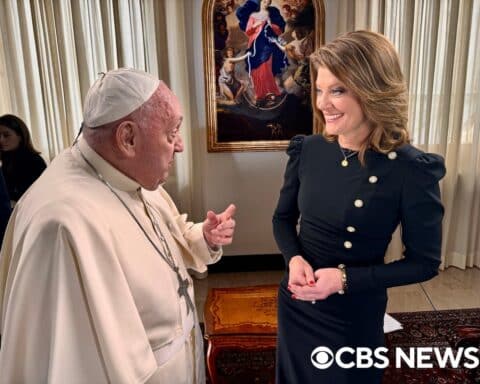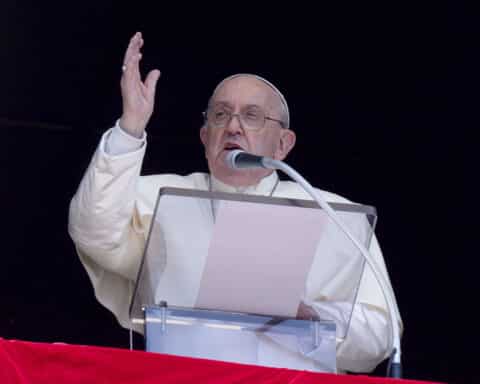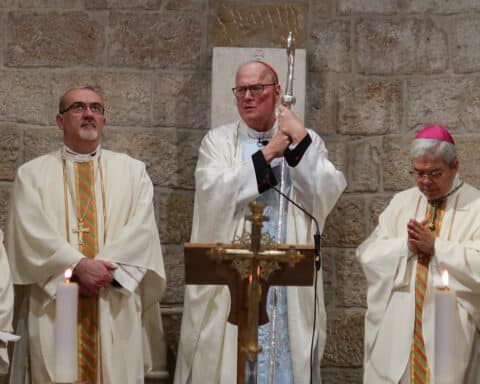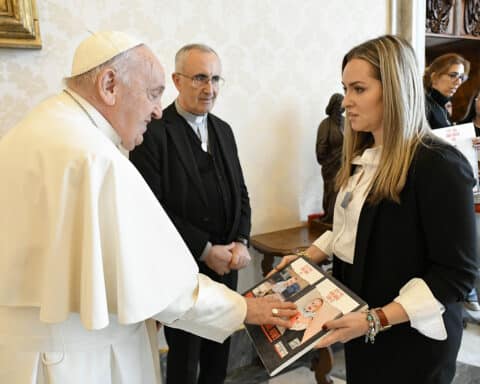JERUSALEM (OSV News) — Since her 23-year-old son Hersh had his left arm blown off at the elbow and was taken hostage into Gaza by Hamas on Oct. 7, 2023, Rachel Goldberg-Polin has gone from the self-described “Jane Doe” anonymity of Jewish woman, to becoming the international voice for hostage families.
She has pushed herself on autopilot into the previously unknown world of public speaking and world leaders in order to gain the release of her son and the other hostages taken by Hamas on that day.
Soft-spoken and slight, Chicago native Goldberg-Polin has become one of the most recognizable faces of the hostage crisis internationally. She has grown visibly thinner and her hair grayer as she and her husband, Jon, are focused on one goal — to rescue their son.
In a conversation with OSV News, Goldberg-Polin said people around the globe, including many Christians, and the pope himself, brought back her faith in humanity after she saw her son abducted and his best friend killed.
A mother’s fight
In the early morning onslaught on agricultural villages along Israel’s southern border and on a group of young revelers at an all-night Nova dance rave at Kibbutz Re’im, Hamas murdered 1,200 people, mostly civilians and including nationals of other countries such as the United States, Germany and Thailand, and kidnapped some 240 people.
Forty people were kidnapped from the party, including Hersh — a dual American-Israeli citizen, and 364 people were killed in the Hamas rampage, according to a civil lawsuit filed by Nova survivors against Israeli security services for negligence.
A hostage release agreement at the end of November, saw 109 hostages, mostly women and children, released in return for 240 Palestinian women and minor-aged prisoners held by Israel. An estimated 136 hostages — including 17 women, two Israeli nationals who have been held for a decade and the bodies of 24 hostages Israel has said are no longer alive — remain in Gaza, according to the Hebrew language online website Walla!
The hostages range in age from 1-year-old Kfir Bibas, who celebrated his first birthday in captivity, to Arye Zalmanovich, 86.
“When I wake up in the morning I say to myself, ‘Now, pretend to be human,’ because if I just do what I feel like doing which is being in a ball on the floor hysterical, I don’t feel like that is going to save him or save any of them. It is a very primal maternal drive,” Goldberg-Polin said in an interview with OSV News in an office close to their home in Jerusalem as the hostages neared the 120-day mark of captivity.
In another daily morning ritual, she takes a piece of masking tape and a black Sharpie marker to write the number of days her son and the other hostages have been in captivity and places it over her heart. On the day she spoke to OSV News, she was wearing the number 117.
Hersh loves music festivals and travel, and is a member of the fan support club of the Hapoel Jerusalem soccer team, known for its pro-coexistence, anti-racist stance, she said. He was also active in an Arab-Jewish soccer league for young athletes.
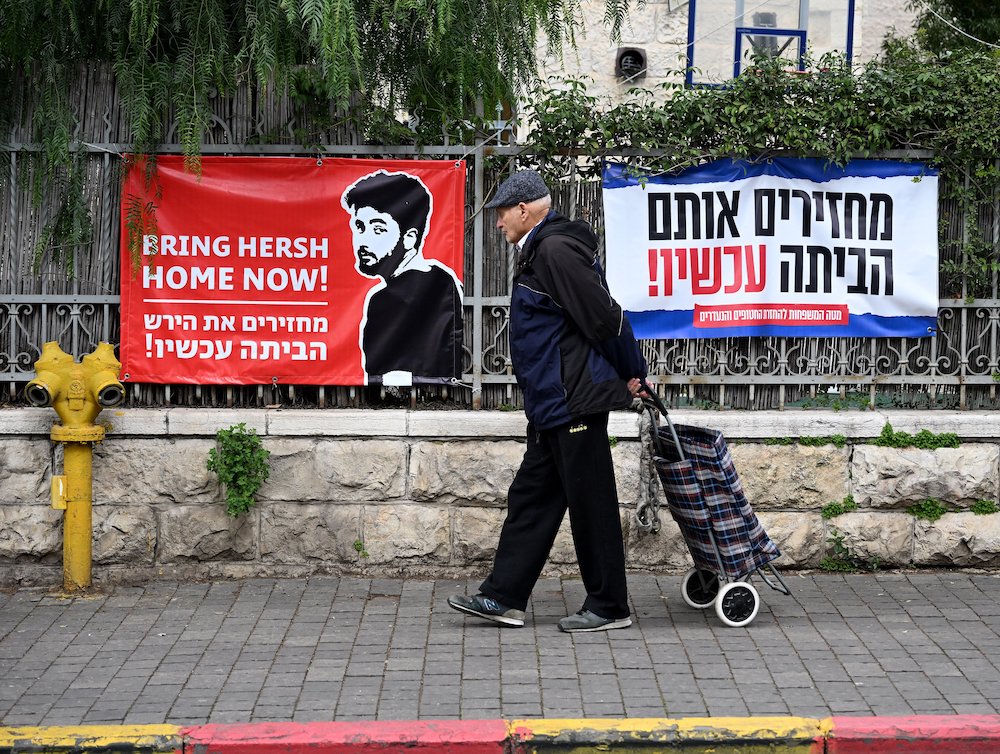
Recovery looks like getting the hostages back
With the help of friends and supporters, Hersh’s parents have launched a wide-ranging social media and public advocacy campaign, which has brought them speaking engagements from the U.N. and the Knesset to visits with U.S. President Joe Biden and Pope Francis at the Vatican.
The Biden administration has been very genuine in seeking a resolution, she said, and in doing what they can.
“They may have to stretch even farther if the people they’re collaborating with are not doing all they can do,” Goldberg-Polin added.
In the wake of the four-month mark since the Hamas massacres, kidnappings and start of the war, Hamas said Feb. 6 it has given its response to a framework proposal for a new cease-fire in Gaza.
With talks about a possible new agreement for a hostage release being negotiated, Goldberg-Polin said she would like to remain “hopeful and optimistic,” but is staying realistic. She doesn’t have time to be angry, as anger isn’t very constructive, she said. Right now, she is feeling frustrated, not knowing whether her son is alive or dead, if he received medical treatment or is in pain from his severe injury.
“The rhetoric that we hear makes all the hostage families nervous. It makes us nervous when leaders say things like, ‘We won’t trade anything, we won’t be flexible.’ It’s very scary for us. I think we’re at a point where we feel like for 117 days we’ve been in slow motion torment,” she said in a veiled reference to some of the comments made recently by extreme-right wing members of Israel’s government. “We also are kidnapped, and if you aren’t going to save them, you should probably tell us.”
“I think the real way to recover from Oct. 7 is to get the hostages back,” she added.
Meeting with Pope Francis
She felt extremely “grateful and privileged” to have met with Pope Francis, along with 11 other hostage families. She showed him the video of Hersh, who had been able to put a tourniquet on his arm to stop the bleeding as he climbed onto the back of a pick-up truck with his arm blown off. The pope was visibly shaken after having seen the video in a Nov. 22 meeting, she said.
“He said something really simple to me, (after seeing the video), to all of us, that what (we’ve) experienced is terrorism, and terrorism is the absence of humanity. Which was really short but so wise because I had, without realizing it really, begun to question humanity,” Goldberg-Polin said.
“And he gave me permission to not lose faith in humanity. I can still have faith and hope that humanity will be victorious over the darkness that we, the hostage families and the hostages themselves, are going through.”
Goldberg-Polin is supportive of the meeting the pope held with 10 Palestinians whose relatives had been killed or otherwise affected in Gaza following the meeting with the hostage families on Nov. 22.
According to the Gaza Health Ministry, as of Feb. 5, at least 27,478 Palestinians have been killed in Gaza since the Israeli-Hamas war broke out.
Relying on prayer, faith
Goldberg-Polin lives an observant Jewish life and her faith helps bolster her through this period, and shows up prominently in her posts and public speeches where she often refers to the Torah and Jewish traditions. As she asks people to reach out to their elected officials to ask for the hostages to be released, she also asks people to pray for her son and the other hostages.
“I have found my faith to be the anchor in this. It doesn’t mean that I am not confused, scared. I use psalms throughout the day to help get me through. There are a lot of psalms that were written in a time of confusion, fear, incomprehension, so I find it helpful. I am happy that I have that and it hasn’t until now been shaken,” she said.
“I am filled with hope and prayer that I will have the privilege of having Hersh come home and that at some point in the rest of my life of making sense of this period.”
Having grown up in Chicago with Christian friends, Goldberg-Polin said she wanted to acknowledge the special joy of the Christmas season for Christians. During Advent she produced a special social media message every week on the Advent theme to “wish our Christian friends and neighbors goodness during each week of Advent,” to tap into the beauty she saw in the weekly themes, and the unity as human beings.
“Then the hard one was joy. And I finally was able to settle on this place where I pictured being at Hersh’s wedding and I pictured holding his first baby. And then I could be joyful,” she said.
She was very touched on Christmas Eve that they received many thousands of photographs of people’s Christmas dinner with an empty plate left with Hersh’s name on it, she said. Catholic supporters sent pictures from midnight Mass where they asked their churches to put his hostage poster on the altar with candles around it and a crucifix.
“I just thought it was the most beautiful demonstration of solidarity with a mother who was crying,” she said. “I think we all call God by different names, but we’re all children of God.”
In another social media post, Goldberg-Polin explains the Jewish tradition of a good deed done in merit of someone else, or so the merit will go for a cause.
Both Christians and Jews have written to her and her husband, she said, and told them the deeds they have done in merit of the swift release of Hersh and the other hostages — such as changing a tire for someone, donating a kidney, holding in their anger at something their child did, or a Christian woman saying psalms for Hersh.
“It’s just words, (but) that kind of thing is powerful. It is just a kindness. And it’s not someone Jewish, it is just someone saying I’m a human. You are a human. We are all human. Seeing just normal, regular people doing good to try to repair such a shattered chapter helps us,” she said.
“There’s something really beautiful that in a time of helplessness — I think many people in the world feel helpless — to not just feel helpless, but to try to catalyze that into doing some sort of good or some sort of fixing of our world that’s broken.”

